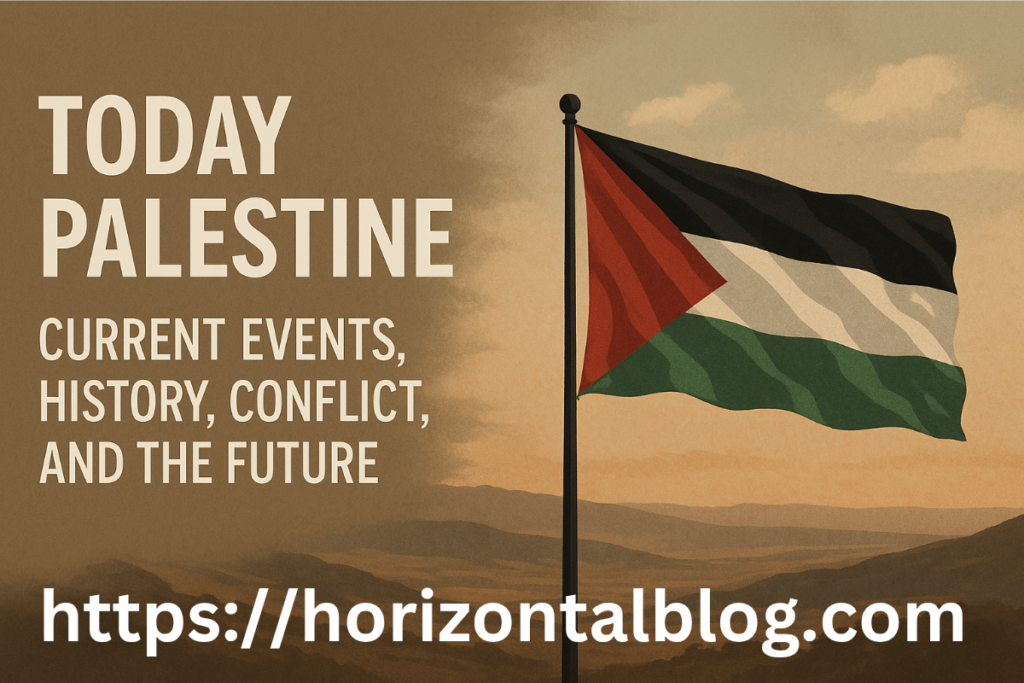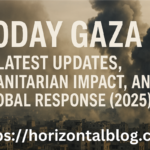Overview Palestine Today
“Today Palestine” refers to the current socio-political situation in the State of Palestine, encompassing Gaza Strip and the West Bank. The region is at the center of one of the world’s most complex and long-standing conflicts.
In April 2025, the world continues to watch Palestine with increasing concern, especially due to the recent escalations between Israel and Palestinian groups, growing humanitarian crises, and intensified global activism.
Palestine today is not just a place on the map—it’s a focal point of history, human rights, religious significance, and international diplomacy.
The Historical Context of Palestine
Understanding the present requires a brief look at the past.
The Birth of the Conflict
- The roots of the conflict date back to the early 20th century during the British Mandate of Palestine, post-World War I.
- In 1947, the UN proposed partitioning Palestine into Jewish and Arab states—this led to the 1948 Arab-Israeli War and the creation of Israel.
- Palestinians were displaced in what they call the Nakba (“catastrophe”).
Territorial Divisions Today
- Gaza Strip: Controlled by Hamas, a Palestinian political-military group.
- West Bank: Partially governed by the Palestinian Authority (PA) but fragmented due to Israeli settlements and military zones.
Recent Developments in Palestine (2024–2025)
Escalation of Violence
Since late 2023, conflict between Israel and armed factions in Gaza has intensified. Key developments include:
- March 2024: Israeli airstrikes in response to rocket fire from Gaza.
- January 2025: A blockade intensified, worsening humanitarian conditions.
- February–April 2025: UN reports note the displacement of over 150,000 Palestinians due to conflict.
Media and Coverage Trends
News around “Palestine today” sees massive spikes during conflict surges. However, many long-term issues remain underreported, such as:
- Water and power shortages
- Restricted movement due to checkpoints
- Loss of civilian lives and homes
Key Players in the Israel-Palestine Conflict
Palestinian Authority (PA)
- Governs parts of the West Bank
- Works diplomatically with international bodies
- Seen as moderate but often criticized for lack of effectiveness
Hamas
- De facto authority in Gaza since 2007
- Engages in armed resistance
- Viewed as a terrorist organization by Israel, the U.S., and the EU
Israel
- Military and political superpower in the region
- Controls borders, airspace, and many aspects of Palestinian life
International Community
- UN, US, EU, Arab League: All play varying roles in diplomacy and aid
- Grassroots movements: Global protests and BDS (Boycott, Divestment, Sanctions) gain momentum
Humanitarian Crisis: Life in Palestine Today
Life for ordinary Palestinians is shaped by a lack of stability and basic rights. Here’s what’s happening on the ground in 2025:
Infrastructure and Living Conditions
- Gaza Strip: 97% of water is undrinkable (WHO, 2024)
- Electricity: Often limited to 4–8 hours per day
- Healthcare: Overwhelmed hospitals, lack of medicine
Displacement and Refugees
- Over 5 million registered Palestinian refugees
- Internal displacement continues due to demolitions and conflict zones
Peace Efforts and Global Involvement
Two-State Solution: Is It Still Possible?
The “Two-State Solution”—an independent State of Palestine alongside Israel—has been the international community’s favored approach for decades. However, continued settlement expansion and lack of dialogue make it increasingly unlikely.
Diplomatic Talks in 2025
- US-backed negotiations stalled due to political changes in Israel and internal Palestinian divisions.
- Qatar, Egypt, Turkey, and Jordan remain active mediators.
Noteworthy Initiatives
- Grassroots peace groups involving Israelis and Palestinians
- Tech-powered storytelling platforms highlighting shared narratives
- Academic collaborations despite restrictions
How Social Media Shapes the Narrative
Social platforms have transformed how the world perceives Palestine today.
Platforms in Use
- Twitter/X, Instagram, TikTok, Threads: Used for real-time footage, news, activism
- Citizen journalism: Plays a critical role amid mainstream media blackouts
Censorship Concerns
- Reports of content suppression when posting about Gaza or Israeli military actions
- Global calls for algorithmic fairness and platform accountability
What You Can Do to Help
Change doesn’t require political power—just action:
Stay Informed
Follow reliable sources:
- Al Jazeera English
- Middle East Eye
- +972 Magazine (Israeli and Palestinian perspectives)
Spread Awareness
- Share verified content
- Use platforms like X and Instagram to amplify stories
Donate or Volunteer
Support NGOs like:
- UNRWA (United Nations Relief and Works Agency)
- Medical Aid for Palestinians
- Amnesty International
Advocate
- Write to your elected representatives
- Join peaceful campaigns or protests
- Promote open, respectful conversations
FAQs on Today Palestine
What is happening in Palestine today?
Palestine is currently experiencing intensified conflict, especially in Gaza, with airstrikes, economic blockades, and severe humanitarian conditions.
Is Gaza part of Palestine?
Yes, Gaza is one of two major territories of the State of Palestine, the other being the West Bank. It has been governed by Hamas since 2007.
Why is there conflict between Israel and Palestine?
The conflict stems from territorial disputes, religious tensions, and unresolved claims to land following the 1948 creation of Israel, displacement of Palestinians, and subsequent wars.
Is there hope for peace in Palestine?
While the situation is dire, peace remains possible through sustained diplomacy, mutual recognition, and grassroots activism pushing for human rights and coexistence.
How can I help the people of Palestine?
You can help by staying informed, donating to reputable charities, advocating for human rights, and engaging in peaceful activism or policy advocacy in your country.
Final Thoughts: Palestine Today Matters More Than Ever
“Today Palestine” is not just a news headline—it’s a call to understand, empathize, and engage. As the situation continues to evolve in 2025, our awareness, advocacy, and action can contribute to a more just and peaceful future for both Palestinians and Israelis.
Whether you’re a student, a policy expert, or a curious global citizen, staying informed is the first step toward change.



